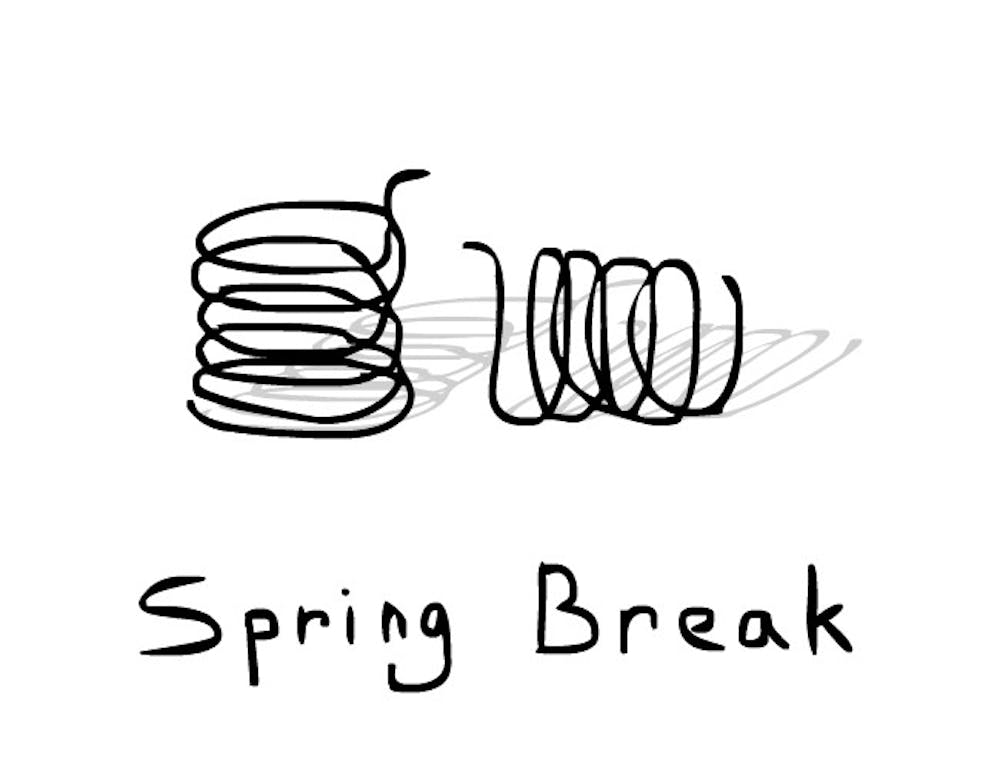Wren Haynes | Echo
When my last class ends at 1:52 next Friday, I'll race back to Swallow, lock my door and catch a getaway car. I would roll down the windows and scream "Freedom!" to the skies-but if I do that, I might lose the syllabus bookmarking my literature anthology. Sneaky textbooks. They follow like Peter Pan's shadow wherever I go-except he wants his back, and I'd prefer that mine stay away. Here are a few reasons why homework over break hinders rather than helps.
1. Spring Break Missions
Sending students as far as Bolivia or as close as Marion, Spring Break Missions take Taylor global. Since immersion is the priority, textbooks won't make the physical journey to the students' destinations.
However, that doesn't mean trip-goers won't worry. Since they're unable to do homework while off campus, assignments extending over break only up the stress of travel. For these adventurers, three options exist. Option A: cram the work beforehand. Option B: speed-write it after. Option C: get a pass from a professor. The first two lead to high stress and subpar work. And the third-well, if some students can be cut due date slack, why are the deadlines critical for the rest of us?
2. Out-of-staters
I'm from Colorado, and you'd think that a person from a state full of hikers would know how to pack light. Right? Wrong. My dad may be Coast Guard strong, but he still grunts when he hefts my portable library in the Colorado Springs airport.
The average Taylor semester is about four months long, and I feel like I carry four months' worth of homework in my backpack when I go home. Getting to see my family is special, but it's made less so when I'm staying up until 2 a.m. writing papers. While my family loves me, they asked for a functional human, not a zombie.
Admittedly, the out-of-staters have it easy compared to the average missionary kid. But the truth still stands-non-local students don't have the option to head home on weekends when they're feeling overwhelmed. Going home is a privilege, and they'd rather spend time with their family than on next week's reading.
3. Break means break
Perhaps the concept's been harped on, but it bears repeating anyway-a break is called a break for a reason. It means to pause, a Sabbath time in the middle of the semester. Professors like to say academics are like our job while we're in college. So riddle me this: If employers don't expect remote work from employees during vacation days, why are students doing homework on breaks?
"Valid," the professor may say. "But there's nothing I've given you that you can't get done before you leave campus. And besides, if you don't have a paper to turn in, you'll skip class to stay home longer."
That's an excellent point. However, the week before break is often the busiest up to that point in the semester. Sure, working ahead is a great idea in theory, but midterms suck time, effort and attention. And as far as skipping class goes, extra credit for attendees or participation deductions for absentees could be an equally effective method to motivate students to return on time.
4. Catchphrase community
One of the core values of Taylor University is intentional community. However, when I lug textbooks back for break, the only thing I'm being intentional about is homework. Perhaps that may seem like a stretch-but for every student who squeezes these assignments in the night they return to campus, there's someone doing take-home tests to the soundtrack of their parents' complaints about out-of-touch faculty.
Sometimes, service, engagement and recuperation are more important than getting homework done. Intentionality stretches beyond the Taylor bubble and includes our families, our home communities and the people we meet while we're off campus.
Do us a favor and let us connect.





